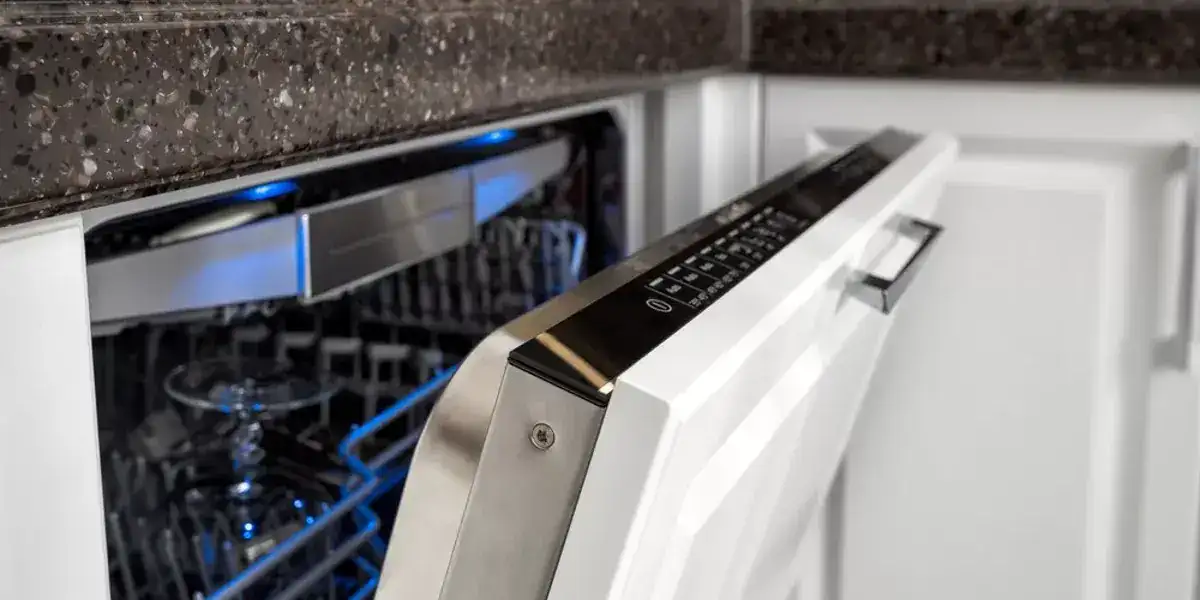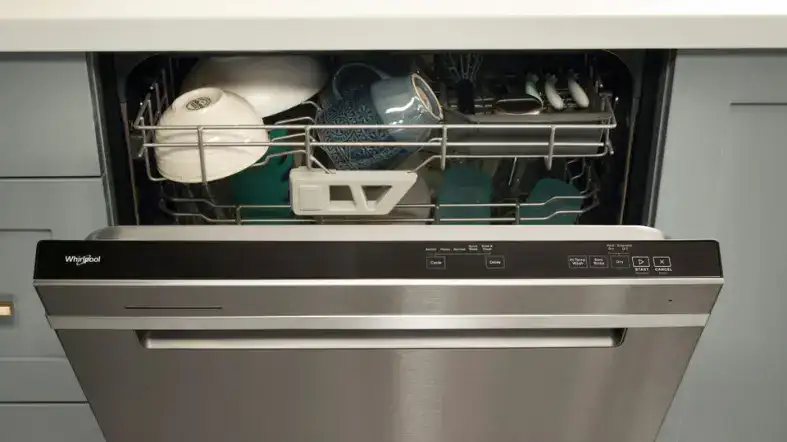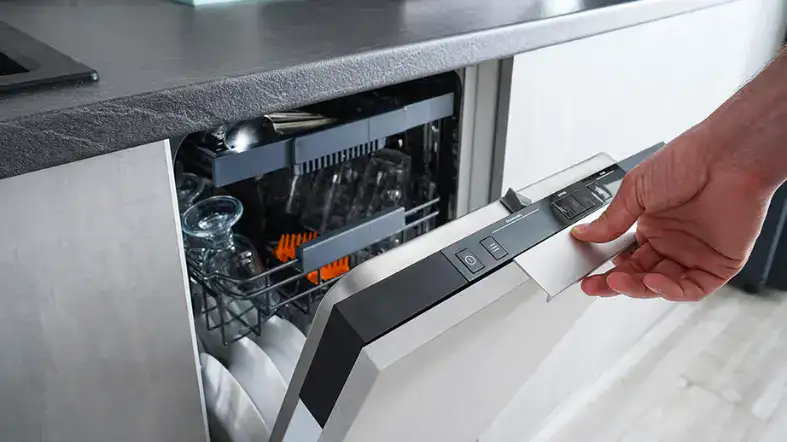Experiencing frustration with your Bosch dishwasher? Those flashing lights and failure to start can disrupt your daily routine.
In this article, unlock the mystery behind Bosch dishwasher lights flashing and not starting. Take on the problem head-on with the help of this article.

What Could Be the Reason Behind My Bosch Dishwasher Not Starting?
Here are the possible reasons why your Bosch dishwasher might not be starting:
Defective Door Latch Causes
A defective door latch might lead the dishwasher to believe that its door is still open. Consequently, the dishwasher’s start function is halted to prevent any accidents.
The door latch, when functioning correctly, engages with the door, ensuring it’s securely closed. When the latch malfunctions, the dishwasher’s safety mechanisms kick in and prevent it from starting.
Bad Circulation Pumps
During a cleaning cycle, the circulation pump circulates water throughout the machine. If the circulation pump fails, it disrupts the necessary water flow for the start sequence.
Without proper water circulation, the dishwasher can’t initiate the cleaning process. A faulty pump won’t push water through the spray arms, resulting in a dishwasher that won’t start.
Control board issues
The control board serves as the brain of the dishwasher, coordinating its various functions. Programming errors or electrical glitches on the control board can impede the startup process.
The control board might not send the right signals to start the wash cycle even if you press the start button. Depending on the issue, the control board may need to be diagnosed, reprogrammed, or replaced.
Heating Element Issues
The heating element is responsible for maintaining the water temperature during the cycle. If it’s faulty and provides inaccurate readings, it can confuse the control board sensors.
Dishwashers might not start if the control board doesn’t receive accurate temperature information. Properly functioning heating elements are crucial to dishwasher performance.
Problems with draining
Clogged drains can cause the dishwasher’s sensors to think it still contains water, creating a false signal.
As a result, the dishwasher might avoid starting to prevent water overflow. Ensure proper drainage and clear any blockages in the drain for the dishwasher to start without a hitch.
Consequences of motor issues
The main wash motor is responsible for moving water and spraying it onto the dishes for cleaning. The dishwasher will not start if this motor seizes due to mechanical issues or electrical problems.
Until the motor runs, water cannot be effectively distributed, which means the dishwasher cannot clean.
Water Supply Disruption Impact
A dishwasher requires a steady and adequate water supply to initiate its cycle. The dishwasher won’t fill with water if your water pressure is inadequate or your water supply is disrupted.
This could be due to plumbing issues, water source problems, or even a clogged water inlet valve.
How Can I Troubleshoot the Issue of Flashing Lights and Non-Starting?

These steps will help you troubleshoot flashing lights and non-starting Bosch dishwashers:
Alignment and latch solutions
Ensuring the door is fully closed and the latch aligns precisely with the magnet is crucial. A misaligned door latch can trigger safety mechanisms, preventing the dishwasher from starting.
Adjust the latch position or realign the magnet if the latch does not engage properly when you close the door. Proper alignment guarantees the dishwasher’s secure closure, enabling it to start safely.
Pump motor resolution
In cases where circulation pump motors display high resistance, they may need to be replaced. Consult your dishwasher’s manual for guidance on testing and replacing the motor.
Measure the motor’s resistance with a multimeter after disconnecting the power. If the reading falls outside the acceptable range, it indicates a malfunctioning motor.
In order to start a dishwasher, the motor must be replaced as per manufacturer instructions.
Heating Element Fix
A functional heating element is vital for maintaining accurate water temperature during the cycle. To diagnose a faulty heating element, measure its resistance using a multimeter.
Unless the resistance value falls within the manual’s normal range, the device is most likely defective. New heating elements restore precise temperature control, ensuring the dishwasher’s cycle starts properly.
Obstruction and Drainage
Addressing drainage and obstruction issues involves inspecting the drain hose and system. Look for clogs, kinks, or obstructions that might hinder proper drainage.
Carefully remove any debris and ensure the drain hose is unobstructed. Water flowing freely through the drain system prevents false signals that prevent the dishwasher from starting.
Control Board Reset
To eliminate programming errors or glitches in the control board, perform a reset.
Start by turning off the power to the dishwasher at the circuit breaker or unplugging it. Leave it disconnected for several minutes to allow the control board to reset.
Reconnect the power and observe if the flashing lights persist. Resetting the control board can often rectify issues that hinder the dishwasher from initiating.
Inspect and repair wash motors
Inspecting the wash motor is essential to determine its functionality. Blockages or seizures can prevent proper water distribution, leading to non-starting issues.
Carefully examine the motor for any obstructions or signs of damage. If the motor doesn’t rotate freely, replacement might be necessary.
A functional wash motor ensures adequate water movement for an effective cleaning cycle.
Water Supply Verification
Proper water supply is integral to the dishwasher’s startup. Check water supply valves to ensure they are fully open, allowing sufficient water flow.
Inspect plumbing for any issues that might restrict water pressure. The dishwasher may not fill correctly or begin the cycle due to inadequate water pressure.
Error Codes
Error codes displayed by the dishwasher provide valuable insights into specific malfunctions. Refer to your dishwasher’s manual to decipher these codes and understand their meanings.
Each code corresponds to a particular issue that might hinder the dishwasher’s starting process. Armed with this knowledge, you can accurately identify the problem and take appropriate steps to address it.
Is a Faulty Door Latch Preventing My Bosch Dishwasher from Starting?

Yes, a common cause of flashing lights and failure to start is a faulty door latch. Here’s how it prevents operation:
Latch misaligned or damaged
Imagine the latch as the handshake between your dishwasher’s door and its body. Wear and tear might damage or misalign a latch, making it difficult to connect with the door frame.
This results in the door not achieving a snug fit even when you close it with all your might.
Closes Door Slightly
Imagine closing the door, but due to a misaligned latch or damage, the door doesn’t seal properly.
Instead, it remains slightly ajar, creating a minuscule gap you might not even notice at first glance.
Unlatched door switch
Inside your dishwasher, a vigilant door switch is at work. This switch is like the sentry guarding the castle. It senses that the door isn’t fully closed and securely latched.
Startup requires fully closed door
Here’s where the safety dance begins. The dishwasher’s engineers designed a clever safety feature. It says, “Hold on! Don’t start yet!”
A safety mechanism prevents the dishwasher from starting until the door is fully closed and latched.
Problems with door latches
Now comes the part where your dishwasher tries to tell you something. A flashing light indicates that your dishwasher has detected a latch problem.
That’s like the dishwasher waving a flag and saying, “Hey, there’s something wrong with the door latch!”
Adjustable or replaceable latches
To tackle this problem head-on, you can try adjusting the latch’s position. Gently tweaking its alignment could work wonders.
You might need to replace the latch if it is beyond repair due to significant damage. You’ll likely see your dishwasher running normally again after this fix since it gets to the heart of the issue.
FAQs on Bosch Dishwasher Lights Flashing and Not Starting
Can Control Board Issues Cause Flashing Lights Problems On A Bosch Dishwasher?
Yes, there can be a number of reasons why indicators flash, including electrical shorts or software errors.
Signaled by blinking lights, these indicators indicate problems with the start sequence.
Does A Clogged Drain Line Make A Bosch Dishwasher Not Start Up?
Yes, a clogged drain line can have a surprising impact. It can trick the sensors inside the dishwasher into thinking that it’s still full of water, even when it’s not.
Due to this miscommunication, the startup is prohibited, preventing the dishwasher from running.
Will A Bad Circulation Pump Motor Keep A Bosch Dishwasher From Starting?
Yes, a malfunctioning circulation pump motor can indeed cause problems.
The dishwasher cannot start its cleaning cycle if this motor is seized up and unable to operate.
Can Low Water Pressure Cause Startup Problems With Flashing Lights?
Yes, low water pressure can be a sneaky culprit. A dishwasher might not receive enough water if there’s inadequate water pressure or an inadequate supply.
This insufficiency can lead to a failure to start up and the appearance of those blinking lights.
Can Bad Wiring Cause Flashing Light Errors When Trying To Start A Bosch Dishwasher?
Yes, it’s quite possible. Bad or disrupted wiring connections can play havoc with the dishwasher’s ability to function.
If you try to start the dishwasher after an electrical disruption, you’ll see those frustrating flashing light errors.
Conclusion
Seeing flashing lights but having your Bosch dishwasher fail to begin washing is understandably annoying.
Lights can indicate component failures, such as lousy door latches or circulation pumps, which can often be repaired DIY.
To get your dishwasher to start and run normally, check for error codes, measure heating elements, and clear drain obstructions. Flashing lights call attention to needed repairs.

